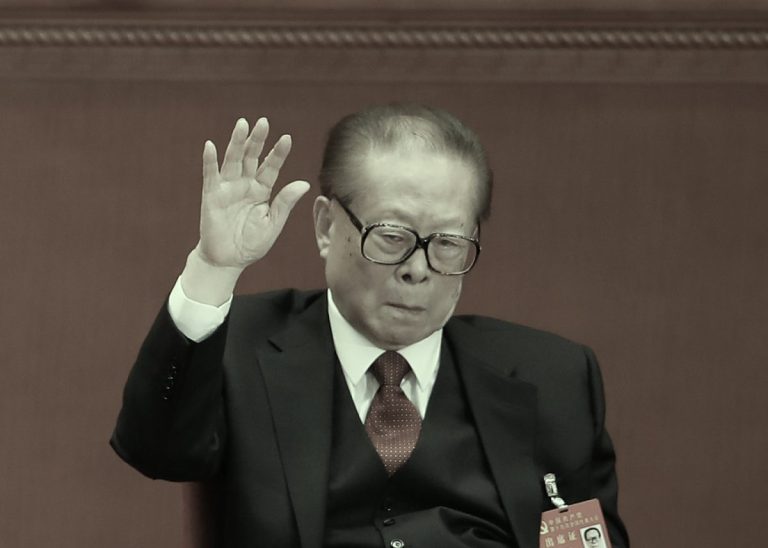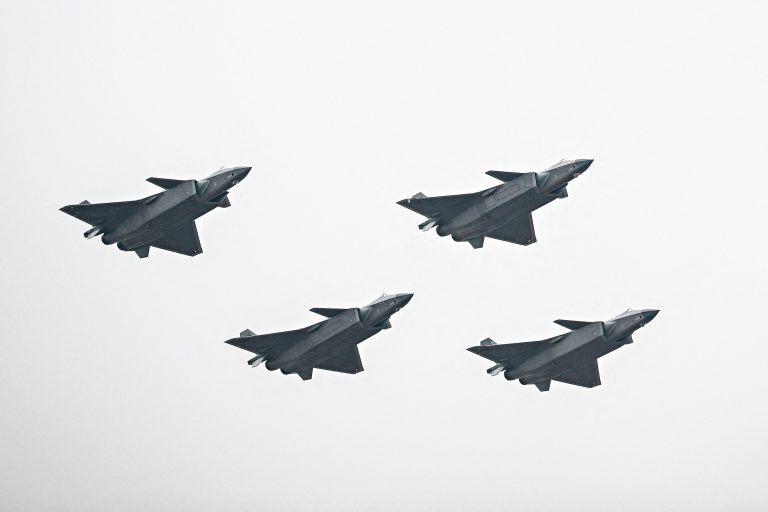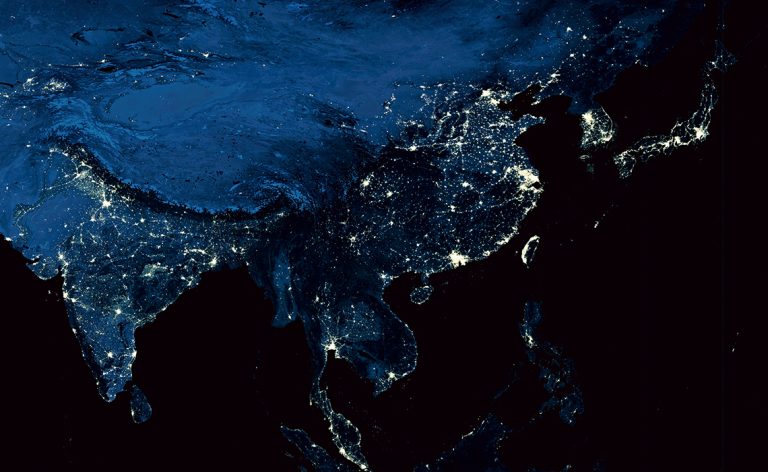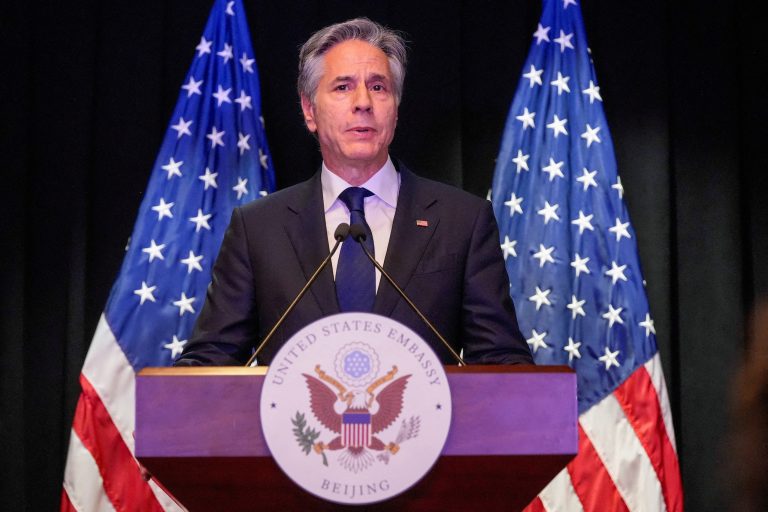Commentary
Former head of the communist Chinese regime Jiang Zemin, who was in office from 1989 to the early 2000s, succumbed to leukemia and multiple organ failure in Shanghai at 12:13 p.m. local time on Nov. 30, according to Beijing’s official media channels and foreign news reports. He was 96.
While sometimes touted as a “reformer” who presided over China’s economic rise, Jiang’s actual legacy is one of massive corruption and unprecedented human rights abuses that have tarnished the country’s image and squandered its fortunes in recent history.
Jiang rose to power in 1989, having previously served as mayor of Shanghai. His crackdown on protesters in the country’s largest city as the Chinese Communist Party (CCP) prepared to crush the democracy movement in Beijing brought him favor with the central leadership, which ousted liberal-leaning Party leader Zhao Ziyang and appointed Jiang as his successor weeks after the Tiananmen Square Massacre on June 4.
The first few years of Jiang’s tenure saw him exercise little real influence, as actual control was in the hands of regime leader Deng Xiaoping and his allies. Hoping to ride the wave of political repression that followed the Tiananmen Massacre, Jiang adopted a left-wing hardliner stance that was only checked by Deng’s 1992 “Southern Tour” to Guangdong Province, which implicitly warned Jiang against halting the market economic reforms that Deng had started in the early 1980s.
The persecution of Falun Gong
Success
You are now signed up for our newsletter
Success
Check your email to complete sign up
Jiang would continue to negotiate more authority and prestige throughout the 1990s, but it was with Deng’s death in 1997 that he assumed dominance over the CCP, outmaneuvering rivals and placing his allies into high ranks.
In July 1999, Jiang Zemin launched the persecution of Falun Gong, a traditional spiritual practice also known as Falun Dafa. Jiang saw Falun Gong and its founder Li Hongzhi as a threat to his and the CCP’s political power, given that government estimates put the number of Chinese practicing Falun Gong at 70 to 100 million — more than the Communist Party’s 66 million card-carrying members. Moreover, Falun Gong’s emphasis on traditional morality and faith put it at odds with the CCP’s atheist Marxism-Leninism.
The anti-Falun Gong campaign was the biggest political repression in China since Chairman Mao’s Cultural Revolution (1966–1976). Estimates of Chinese arrested for practicing Falun Gong go into the hundreds of thousands or millions, with many becoming victims of lengthy prison sentences, forced labor, physical torture, rape, brainwashing, or outright murder by the authorities. Since 2006, experts have uncovered increasing evidence that Falun Gong practitioners and other prisoners of conscience were being killed via forced organ harvesting.
‘Rule by corruption’
Jiang was able to establish himself as undisputed leader of the CCP regime after Deng’s death in 1997, and the persecution of Falun Gong gave him further opportunity to stack the ranks of the Party and Chinese government with those loyal to himself.
Cadres promoted in the 2000s were often active participants in the persecution of Falun Gong, which took more than a year and a half to fully implement due to the general lack of enthusiasm for the campaign outside of Jiang’s circle. Notable Jiang faction members whose political careers grew along with their propensity to take part in the repression include the now-purged Bo Xilai, the provincial governor and later Politburo member; Zhou Yongkang, who first headed the secretive “610 Office” CCP executive group charged with coordinating the media and police to “handle” Falun Gong, and then was promoted to oversee the Central Political and Legal Affairs Commission (PLAC), another Party organization with authority over China’s judicial system, labor camps, and millions of paramilitary police personnel; as well as high-ranking military generals Xu Caihou and Guo Boxiong. All used their positions to accumulate massive wealth and profited from the expanding Chinese organ transplant industry, which is concentrated in state- and military-run hospitals.
During the 1990s, the economic reforms instituted under Deng Xiaoping were bearing fruit, and Western elites eager for more engagement with China helped the meteoric rise of Chinese industry, technology, and living standards. In 2001, China joined the World Trade Organization, further cementing its position as an emerging economic superpower.
For the Jiang faction, the wealth rolling into China provided the leadership with many opportunities to secure political loyalty by creating a vast network of corrupt vested interests throughout the Party-state. Where Deng had his saying “to get rich is glorious” and advocated “hiding one’s strength and biding time,” Jiang followed up with the adage “keep quiet and make a huge fortune” (悶聲發大財).
While Jiang stepped down from his posts as CCP general secretary, Chinese president, and head of the Party’s Central Military Commission between 2002 and 2004, his successor Hu Jintao was never able to run the country in his own right, as senior positions were dominated by the Jiang faction. The Politburo Standing Committee, the CCP’s highest decision-making body, was expanded to nine members when Hu took office and stacked with those loyal to Jiang. In 2008, when Hu’s premier Wen Jiabao wished to dispatch Chinese troops to help with rescue efforts at the site of the Wenchuan earthquake in Sichuan, Gen. Guo Boxiong, the Jiang factionalist, delayed the deployment, saying that he only took orders from “the old leader.” As a result, much of the 72-hour-period following the earthquake was wasted and thousands of preventable deaths occurred.
According to Japan’s Sankei Shimbun, Jiang himself retained an office in the headquarters of the Central Military Commission until 2012, when Xi Jinping came to power.
Sowing the seeds of China’s decline
Mainstream discourse condemns current Chinese leader Xi Jinping for an authoritarian turn in the Party’s rule, increasing state control over the economy, mass internment of the Uyghurs and other ethnic minorities, crushing Hong Kong’s freedoms, aggressive “wolf-warrior” diplomacy, and other overt manifestations of communist rule. However, much of this was brought about by the decisions made either by Jiang personally or as a direct consequence of his leadership, which prized maintaining the CCP’s ideological primacy and the privileges of its officialdom over the actual improvement of China’s social, legal, economic, and cultural future.
Periodically, voices from the overseas Chinese media scene emerge to criticize and call for the removal of Xi Jinping, but place little emphasis on the broader role of the Communist Party’s 70-plus years of misrule, and more suspiciously paint Jiang in a glowing light. Such messaging is joined by commentary published by major Western outlets describing Jiang as a “nostalgic” figure or a leader to whom China has to thank for its rise.
While China saw impressive economic growth in recent decades, the corruption and malfeasance during Jiang’s era of political dominance from 1997 to 2012 saw interest groups carve out powerful fiefs in both the state-owned and private sectors. The reform of China’s Soviet-style state industries advocated by leaders such as Zhao Ziyang or Zhu Rongji was scaled down or halted, leaving them inefficient Party-controlled enterprises susceptible to graft.
Local and provincial authorities seized farmland and in many cases deprived existing residents of their homes to get a piece of the rapidly growing real estate bubble. The public decried “naked officials” sending their relatives and ill-acquired wealth overseas.
As the CCP carried out its persecution of Falun Gong, authorities also intensified “stability maintenance” operations in ethnic minority regions, such as Xinjiang and Tibet. Independent house Christians came under increasing pressure, and the regime’s bloated internal security forces — which at one point enjoyed a budget larger than that of the People’s Liberation Army — cracked down on Chinese protesters with near impunity. Human rights lawyers who dared stand up for the rights of the disenfranchised often met with similar treatment to that suffered by the victims they helped represent.
The Great Firewall and Communist China’s pervasive, AI-assisted mass surveillance and online censorship also began on Jiang’s watch, with the “Golden Shield” project that put the highest priority on scrubbing information related to Falun Gong from the Chinese internet.
An entrenched legacy
Despite many Jiang faction members having been taken down in Xi’s anti-corruption campaign, there is much to indicate that followers of the “old leader” retain influence behind the scenes and even among foreign backers. Many of Jiang’s old colleagues remain at large as retired CCP “elders” — such as former Chinese president and Jiang’s right-hand man Zeng Qinghong — or in senior posts — such as Supreme People’s Court chairman Zhou Qiang — while those with links to the Jiang faction stayed on the Politburo Standing Committee even after Xi took a third term as CCP general secretary this October.
The entrenched legacy of Jiang Zemin and his faction can be obliquely observed in careful readings of the turgid missives produced by official Party mouthpieces. The regime periodically reminds cadres of the need to remove the “remaining poison” of purged officials associated with the Jiang faction, purges Jiang factionalists in the security state, and deploys subtle yet telling references to figures like the former vice president Zeng.
Jiang himself thus far appears politically untouchable, being lauded by state-run Xinhua’s obituary as a “comrade” with considerable achievements in various fields. Similarly, according to Australia-based dissident Chinese jurist Yuan Hongbing, the Xi leadership had intended to “refute” Jiang’s legacy with the CCP’s third “historical resolution” published last year to mark the 100th anniversary of the Party’s founding, but could not muster sufficient internal consensus to do so and was blocked by retired Politburo Standing Committee member Zhang Gaoli, a Jiang supporter.
The “old leader’s” death comes amid mounting economic downturn in China, sharpening international scrutiny of Xi’s rule, and rising domestic unrest, as seen in the recent protests across many Chinese cities over ruinous “zero-COVID” lockdowns that have decimated businesses and brought about humanitarian tragedies, focusing the anger of the Chinese people on the Communist Party and its current leaders. While Jiang may have contributed decisively to the malaise China now finds itself in, his demise does not give the CCP or Xi any cause for respite — those who cling to the Party and its totalitarian philosophy of struggle will see themselves on the losing side of history.












